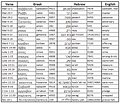New Testament Jewish Colloquialisms/Idioms never translated? 1.0
Discover the Fascinating World of New Testament Hebraic and Hebrew Studies
Here are explanations of some New Testament colloquialisms, along with references from ancient Jewish sources that provide context to their first-century meaning:
1. "Kingdom of God/Heaven" (Matthew 4:17): The phrase "Kingdom of God" or "Kingdom of Heaven" referred to God's reign and rule in the hearts and lives of people. In the first-century Jewish context, it carried the sense of divine authority and the establishment of God's righteous order on Earth. Jewish sources like the Dead Sea Scrolls (1QS 9:21) and the Psalms of Solomon (17:30) express similar expectations of a future kingdom where God's sovereignty would be fully realized.
2. "Son of Man" (Mark 10:45): Jesus' use of the title "Son of Man" drew from Daniel 7:13-14, where a heavenly figure is presented as receiving eternal dominion from God. In the first-century Jewish context, this term was understood as a messianic title, representing a divine figure who would bring deliverance and judgment. Jewish literature like 1 Enoch (1 Enoch 46:1-4) and 4 Ezra (4 Ezra 13:3-5) provide parallels to the concept of the "Son of Man" as a celestial figure associated with eschatological events.
3. "Born again" (John 3:3): The phrase "born again" or "born from above" referred to a spiritual rebirth or transformation. In the first-century Jewish context, it signaled a radical change of heart and allegiance to God. Similar ideas of being born anew or born of God can be found in Jewish texts like the Wisdom of Solomon (Wisdom of Solomon 2:16) and the Qumran scrolls (1QS 11:20).
4. "Blessed are the poor in spirit" (Matthew 5:3): The phrase "poor in spirit" conveyed a sense of spiritual humility, recognizing one's dependence on God. In the first-century Jewish context, it referred to those who acknowledged their spiritual poverty and need for God's grace. Jewish sources such as the Psalms of Solomon (Psalms of Solomon 3:16) and the Qumran scrolls (1QH 5:23-24) contain




